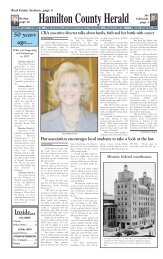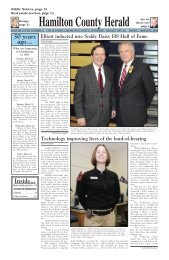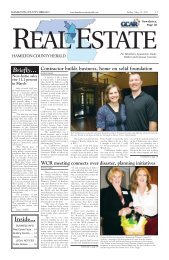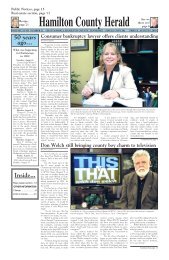50 years ago... Inside... - Chattanooga Bar Association
50 years ago... Inside... - Chattanooga Bar Association
50 years ago... Inside... - Chattanooga Bar Association
Create successful ePaper yourself
Turn your PDF publications into a flip-book with our unique Google optimized e-Paper software.
10 Friday, June 13, 2008 HAMILTON COUNTY HERALD<br />
Commentary: Anticipate problems to avoid ethical elder law dilemmas<br />
by Kimberly E. O’Leary<br />
The Daily Record Newswire<br />
After almost 20 <strong>years</strong> of<br />
practicing law, I joined an<br />
elder law practice in 2000. I<br />
had represented a wide range<br />
of civil clients in a variety of<br />
matters — more a generalist<br />
than a specialist — and<br />
assumed that representing senior<br />
citizens would be similar to<br />
my past practice.<br />
After eight <strong>years</strong> of elder<br />
law practice, I can say with<br />
great confidence that I<br />
encounter on a regular basis<br />
ethics questions that would<br />
have curled my hair in my previous<br />
jobs.<br />
In elder law, ethical<br />
dilemmas abound in regular,<br />
daily encounters with clients<br />
right in the heart of my law<br />
office. I have learned — and<br />
am still learning — that it is<br />
critical to anticipate problems<br />
before they occur. Once the<br />
dilemma springs into being, it<br />
is very hard to solve in a satisfactory<br />
manner. The lawyer<br />
who can anticipate the problem<br />
can prevent it from occurring.<br />
For example, during the<br />
first encounter with the office,<br />
it is sometimes hard to know<br />
who the client is. Some senior<br />
citizens call to make their own<br />
appointments. But frequently,<br />
initial contacts are made by<br />
adult children, care workers,<br />
social workers or neighbors.<br />
Most of the time callers have<br />
the welfare of the senior citizen<br />
in mind and they understandably<br />
want to be involved.<br />
However, in our office, as<br />
in most offices that represent<br />
the elderly, the elderly person<br />
is considered the client and is<br />
escorted into the interview<br />
alone.<br />
The Elder Law Clinic at<br />
Wake Forest School of Law<br />
developed a brochure called<br />
“Why Am I Left in the<br />
Waiting Room?” (find it at<br />
www.abanet.org/aging/publi-<br />
WOMAN WONDERS<br />
WHY ALL HER LOVERS<br />
HAVE BEEN CHEAP-<br />
SKATES<br />
DEAR AMY: I am 44 and<br />
have attracted cheap men all<br />
of my life.<br />
Looking back, I realize<br />
that my boyfriends were<br />
cheap. My husband is cheap<br />
(we live comfortably), my<br />
lovers have all been cheap<br />
with me, but what’s even<br />
more painful is that they<br />
have told me about the gifts<br />
they bought for their wives<br />
and former mistresses.<br />
My current lover and I<br />
have been together for more<br />
than two <strong>years</strong>. He is a successful<br />
physician and enjoys<br />
a nice lifestyle.<br />
I have enough “things,”<br />
but it is the attention and<br />
thought that counts, and I<br />
think that a long-term relationship<br />
warrants gift-giving<br />
“just because” — to make<br />
your lover happy.<br />
cations/docs/4cbrochure.pdf)<br />
to explain what to most<br />
lawyers is a pretty basic concept<br />
— that lawyer-client confidentiality<br />
exists in private<br />
between a lawyer and a client.<br />
Even after establishing<br />
who the client is, there can be<br />
complications. Some of the<br />
people helping seniors think<br />
they know what is best for the<br />
senior, even if it is not what<br />
the senior wants. Third parties<br />
might see the involvement of<br />
these “helpers” as grounds for<br />
undue influence.<br />
Having a hard and fast<br />
rule that you interview the<br />
senior alone first, only bringing<br />
in others to help if the situation<br />
warrants it, can prevent<br />
the ethical dilemma. Keeping<br />
the elderly client abreast of<br />
every action, even if someone<br />
is helping with the case, can<br />
also prevent ethical problems.<br />
Another common ethical<br />
issue in elder law is couples<br />
who want joint representation,<br />
frequently for estate<br />
planning. The ethical rules<br />
squarely require lawyers to<br />
decline representation of one<br />
client if “representation will<br />
be directly adverse to another<br />
client, unless ... the lawyer<br />
believes the representation<br />
will not adversely affect the<br />
relationship with the other<br />
client ... and each client consents<br />
...” (Rule 1.7, Rules of<br />
Professional Conduct)<br />
The comment to the rule<br />
states: “The critical questions<br />
are the likelihood that a conflict<br />
will eventuate and, if it<br />
does, whether it will materially<br />
interfere with the lawyer’s<br />
independent professional<br />
judgment in considering alternatives<br />
or foreclose courses of<br />
action that reasonably should<br />
be pursued on behalf of the<br />
client.” (Comment to Rule<br />
1.7, p 782) It is not difficult to<br />
imagine scenarios where the<br />
economic or social interests of<br />
one member of a couple might<br />
collide with those of the other.<br />
Ask Amy<br />
Advice for the Real World<br />
By Amy Dickinson<br />
Tribune Media Services<br />
He once said that he is<br />
afraid that my husband would<br />
see a present and question it,<br />
and I assured him that I<br />
would make sure my husband<br />
didn’t see it. He also said I<br />
should not give him anything<br />
because his wife might see it.<br />
What advice can you<br />
give me? I need to know what<br />
I am doing wrong. Is there a<br />
profile of women who attract<br />
cheap men? — Wondering<br />
DEAR WONDERING:<br />
There is a profile of women<br />
who attract cheap men.<br />
These are women who don’t<br />
value themselves, who<br />
cheapen their relationships<br />
by being unfaithful and who<br />
could be “bought” for the<br />
price of an occasional present<br />
from an unfaithful lover.<br />
You sound very unhappy.<br />
Your life sounds sad. When<br />
you start to value yourself,<br />
others will start to value you.<br />
Then the gifts (non-material<br />
but valuable all the same)<br />
Elder law practice is that<br />
lawyers typically and routinely<br />
represent both members of a<br />
couple in these matters.<br />
Because the possibility is so<br />
high that a conflict might<br />
develop, elder law practitioners<br />
have developed protocols<br />
for explaining to clients why<br />
they should each consider separate<br />
counsel and that the<br />
lawyer will have to withdraw<br />
from both if an actual conflict<br />
occurs.<br />
Most lawyers I have consulted<br />
present each client with<br />
an example of such a conflict,<br />
such as one of the clients<br />
revealing that he or she has a<br />
child the other client knows<br />
nothing about. Lawyers disagree<br />
about what to do if that<br />
happens (do you tell the other<br />
party?), but lawyers agree that<br />
whatever action you take<br />
should be communicated in<br />
advance, before either side<br />
tells something to the lawyer<br />
he or she will regret later.<br />
Each office should have a<br />
detailed protocol to explain<br />
this potential conflict to couples.<br />
A third common ethical<br />
problem is competency — at<br />
the time of representation and<br />
later on. Many people are<br />
mentally razor sharp into their<br />
hundreds and for their entire<br />
lives. Some experience mental<br />
decline, often in slow and<br />
barely perceptible ways.<br />
Many people keep strong,<br />
close, stable relationships with<br />
family and friends all their<br />
lives. Some find new friends<br />
and become alienated from<br />
family, and sometimes this<br />
happens when they age.<br />
All people decline physically,<br />
although at different<br />
rates and in different ways.<br />
Sometimes lack of complete<br />
hearing or vision or a slowing<br />
of speech can be misinterpreted<br />
as mental decline when it is<br />
not. When a client who is 30<br />
wants to give all of her money<br />
to charity, she is considered<br />
will start to flow.<br />
DEAR AMY: My best<br />
friend of 10 <strong>years</strong> and her<br />
fiance recently announced<br />
their engagement. He’s in<br />
the National Guard and is<br />
leaving for a tour of duty.<br />
Their original wedding<br />
date was a date that I had a<br />
work obligation and had no<br />
way out of. I was upset that I<br />
was going to have to miss it,<br />
but there was absolutely<br />
nothing I could do.<br />
My friend called me last<br />
night saying they had<br />
received her fiance’s tour<br />
papers. He’s not leaving until<br />
September, which is later<br />
than originally thought. She<br />
decided to change the date so<br />
that I could be there. After<br />
all, we’ve been talking about<br />
our weddings for many <strong>years</strong>,<br />
and we were both upset I<br />
would have to miss it.<br />
Then to my dismay she<br />
didn’t ask me to be a bridesmaid!<br />
She moved the date<br />
just for me, so it makes sense<br />
to me that she would then<br />
want me to be in her wedding.<br />
And on top of that, one<br />
of the girls she has chosen to<br />
be a bridesmaid is a girl she<br />
has known for a year or two<br />
and recently had a huge<br />
falling out with.<br />
honorable. When a client of<br />
100 wants to give all of her<br />
money to charity, she is considered<br />
mentally questionable.<br />
I have seen very old<br />
clients labeled “paranoid” for<br />
complaining about personal or<br />
financial care by a family<br />
member, only to discover upon<br />
investigation that the care was<br />
indeed substandard by any<br />
objective measure. These<br />
complexities require lawyers<br />
to understand that there exist<br />
a wide range of medical and<br />
mental competencies, and to<br />
ask whether a client is competent<br />
to perform a specific act,<br />
rather than some generic competency<br />
standard.<br />
For example, if a person<br />
knows what they have and<br />
who are the “natural objects of<br />
bounty,” the law says that person<br />
is competent to execute a<br />
will. Other standards apply to<br />
other transactions.<br />
Even if a person comes to<br />
you clearly competent and<br />
clearheaded, in the prime of<br />
life, it is foreseeable that, at<br />
some point in the future, that<br />
person may not understand<br />
what is going on. For this reason,<br />
many clients engage in<br />
planning for a future when<br />
they might not be able to<br />
make decisions.<br />
Lawyers frequently fail to<br />
discuss how the client wants<br />
the lawyer to handle disclosure<br />
of confidential information<br />
in a future when the<br />
client cannot waive access to<br />
private attorney-client materials.<br />
For example, a 60-yearold<br />
client may indicate she<br />
does not trust her siblings and<br />
wants her nephew to handle<br />
her affairs should she become<br />
incompetent. Ten <strong>years</strong> later,<br />
if one of the siblings comes to<br />
your office asking for help<br />
obtaining a guardianship<br />
against his incompetent sister<br />
(your former client), not only<br />
can you, of course, not represent<br />
the brother, but you also<br />
Am I being childish or is<br />
my frustration warranted?<br />
I’m very upset that I’m<br />
not going to be a part of her<br />
wedding.<br />
Should I approach my<br />
best friend about this or simply<br />
be happy for her and just<br />
be at the wedding? —<br />
Confused<br />
DEAR CONFUSED:<br />
Your friend may not have<br />
changed her wedding date<br />
just for you, though it’s good<br />
that you can now attend.<br />
It’s fine to say to your<br />
friend, “I have to be honest<br />
with you — I was hoping to<br />
be a bridesmaid.”<br />
But don’t pressure her,<br />
ask her to explain her reasoning<br />
or expect her to<br />
change her scheme because<br />
of your statement. Simply<br />
express your wish and then<br />
let it go.<br />
Beyond that, remember<br />
that this is her day and be<br />
happy for her. Attend the<br />
wedding, be a good sport and<br />
do your best to celebrate and<br />
enjoy her happiness.<br />
DEAR AMY: I’m<br />
responding to the letter from<br />
“Loyal Fan,” whose neighbor<br />
is a cigar smoker.<br />
While I completely agree<br />
with the advice given by you<br />
cannot inform the nephew of<br />
your client’s wishes absent an<br />
informed waiver obtained<br />
when the client was competent.<br />
Similarly, attorneys often<br />
obtain permission in advance<br />
to share a copy of a will with<br />
persons the client nominated<br />
to serve as personal representative.<br />
However, the client might<br />
want his attorney to share a<br />
copy of the will with any family<br />
member who asks for one.<br />
Does the client want her<br />
attorney to provide information<br />
if someone is challenging<br />
a will? Elder law attorneys<br />
should have conversations<br />
with every client to find out<br />
whether the client wants the<br />
attorney to share her wishes or<br />
copies of documents with anyone<br />
if she becomes incompetent<br />
or after her death.<br />
The application of the<br />
Rules of Professional Conduct<br />
to elder law practice make this<br />
area of law one of the most<br />
interesting real-life applications<br />
of legal ethics that exists<br />
in law practice. The National<br />
Academy of Elder Law<br />
Attorneys (NAELA), recognizing<br />
how difficult the ethical<br />
issues are, has developed<br />
aspirational standards for elder<br />
law attorneys which can be<br />
found at<br />
www.naela.com/PDFFiles/aspirationalstandards.pdf.<br />
The struggle to protect<br />
the dignity and autonomy of<br />
our senior citizens with the<br />
desire to help those who are<br />
struggling with mental confusion<br />
is a constant tension in<br />
this arena. Elder law practitioners<br />
should take the time to<br />
consider in advance a range of<br />
probable scenarios and discuss<br />
these with their clients.<br />
The clients will be happy<br />
the attorney is thinking about<br />
these problems in advance,<br />
and the attorney will minimize<br />
the risk of making a false step.<br />
❖<br />
and the smoking researcher<br />
you quoted, it can be hard to<br />
tell a person that they can’t<br />
smoke a cigar on their own<br />
patio.<br />
My suggestion is to set<br />
up a floor fan on that side of<br />
the patio that will help blow<br />
the smoke away and to turn<br />
it on when he lights up. It<br />
might serve the dual purpose<br />
of letting her get a breath of<br />
fresh air and letting him<br />
know that the smoke is<br />
affecting his neighbors. —<br />
Rory<br />
DEAR RORY: The cigar<br />
smoker in question certainly<br />
excited many readers.<br />
I’ve received dozens of<br />
letters suggesting that the<br />
judicious placement of a fan<br />
could be just the thing to<br />
solve this particularly smoky<br />
problem.<br />
(Send questions via email<br />
to askamy@tribune.com<br />
or by mail to Ask Amy,<br />
Chic<strong>ago</strong> Tribune, TT<strong>50</strong>0,<br />
435 N. Michigan Ave.,<br />
Chic<strong>ago</strong>, IL 60611.)<br />
© 2008 BY THE<br />
CHICAGO TRIBUNE DIS-<br />
TRIBUTED BY TRIBUNE<br />
MEDIA SERVICES, INC.<br />
© 2008 Tribune Media<br />
Services. All rights reserved.<br />
❖
















